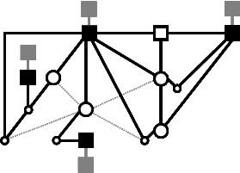Firstly, I want blogs to be well-integrated in the Moodle experience. I do not want to just bolt on Simpblog or WordPress. Most standalone blogs have comments because there is no other way for readers to discuss things (one assumes they don't have blogs). In Moodle though we already have lots of ways for discussions to happen, and everyone has a blog.
So what I'm trying to do is extract the part of of what makes Blogs unique (ongoing unstructured public reflection) and make that work well first, then carefully link it in with the other tools in Moodle. It's much harder to take features away than add them carefully.
Firstly, there is a big conceptual overlap between a blog and a forum. See this listing of all the discussions you've started - it looks suspiciously like a blog. I am convinced that if we allow blogs to effectively be like user-centered forums that a lot of important discussion will float out the blogs (which are not course-based) and make "keeping up" with a particular course very difficult.
If you think keeping up with forums is hard now, imagine if every user has their own.
Secondly, if you want to use blogs to collect reflections from students and comment on them or grade them then we already have Assignments for that. If there is something missing about Assignments then perhaps we need a new assignment type, but anything you are assigning students to do for feedback is an assignment.
Overall, I view blogs as an external window to the course activities, a "skin" of not-private comments that you might monitor via RSS etc and use to access the forums and other activities within Moodle.
So my aim for 1.6 was simply to have a basic framework up that we can get used to and better see where we might go with the next level. If you want WordPress go and install it now, I'm not stopping you.
Here are my ideas at the moment, but they need feedback and discussion from those who have trialled the current Blogs in 1.6.
- LINKING TO/FROM BLOGS: We need to make it easy to blog ABOUT things around Moodle. Daryl and I were talking about "blog this" buttons placed via an easy API on every page which would take you direct to a "new entry" editing screen already prefilled with a link to the item.
For better internal data consistency it might be best to actually store a link field in some Moodle format (non-URL) with the post. There was also talk of some sort of trackback-like mechanism to detect when blogs get linked to. - DISCUSSION ON BLOGS: We need to make feedback on blogs easy and sensible. One idea is to have a blog this button on each blog entry as above (so a reply to a blog is your blog entry).
Another idea is to have a "Discuss this blog" link which takes you to a special course forum for discussing blog entries.
I'd appreciate any constructive thoughts about these directions and others you have thought of.
 I like that with this new blog they can choose to publish from the very beginning if they would like to do so.)
I like that with this new blog they can choose to publish from the very beginning if they would like to do so.) 
 .
.





 ) than a journal might have provided. Recently I have had faculty comment that they want a reflective blog, as discrete journals did not encourage the students to integrate across the full extent of the course (both in time and content).
) than a journal might have provided. Recently I have had faculty comment that they want a reflective blog, as discrete journals did not encourage the students to integrate across the full extent of the course (both in time and content).